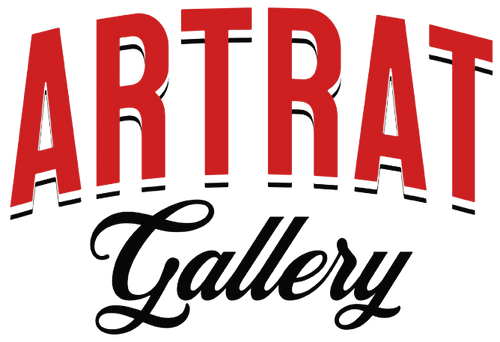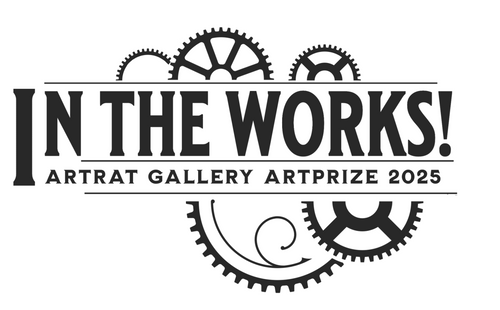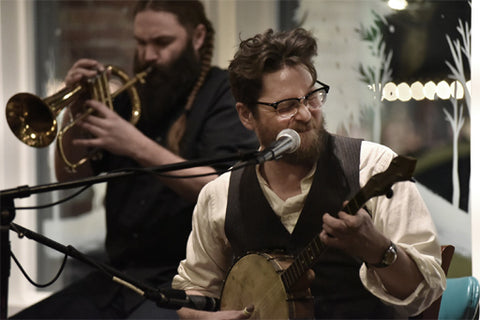This Sunday, Feb. 19, ArtRat Gallery is excited to welcome “guitarist, songwriter, educator and one-man band” Rollie Tussing to Americana Sundays, ArtRat’s monthly concert series. The show runs 3-5pm at 46 Division Ave. S in the heart of downtown Grand Rapids. (Admission $15; tickets available on Eventbrite.)
Based in Ann Arbor, Michigan, the award-winning finger-style guitarist performs timeless classic and country blues, dewy-eyed tunes of the '20s, and godforsaken songs of the 19th century.
His own compositions are influenced by those same lonesome, haunted and abandoned melodies that we all forgot to remember.
You not only write and perform, you're a curator of forgotten songs from the early 20th century. What inspired your quest for these buried treasures, and what do you consider their significance?
My older siblings listened to ‘70s rock, and my mother listened to country. I grew up listening to those styles of music.
The themes that really caught my attention were the more roots-oriented aspects of those songs. I was always more interested in the stripped-down acoustic songs than the overproduced ones. Reading the liner notes of the records around our house, I saw names like Jimmie Rodgers, A.P. Carter, Muddy Waters and Willie Dixon listed in the songwriting credits. When I got old enough, I sought out records by these artists. Their music — the original early recording artists — it was that sound that stuck with me. (Struck a chord?)
You spent time in the South, exploring music of the region, and you also lived on the West Coast, in Portland. How does your work tap into these different geographies?
I still find that there can be regional aspects to folk/roots music. When I hit the South, I heard hill country blues for the first time. I was able to take a couple of lessons from second-generation acoustic Delta blues players.
Ten years later, when I hit the West Coast, I found a huge population of roots players, from teenage train hoppers to ex-’60s hippies who had been playing jug band music for the past 40 years. Many of those musicians came from other parts of the country and would bring their own regional take with them. I tried to absorb all that I could.
Tell us about your teaching career. How does your work as an educator inform your work as a composer and performer, and vice versa?
When I did a music-in-the-schools program, I tried to get younger people to write songs in a folk tradition. I broke down the ballad and blues form into something like American haiku. I also discovered that the more simple a form is, the more freedom in those constraints.
West Michigan is a thriving center for roots music. What makes it a special place for Americana?
There seems to be a condensed amount of talent in Michigan in general. It seems to be most concentrated in Detroit and Western Michigan. I know a lot of West Michigan performers, but I am not very familiar with the gigging scene. All of the artists I know from the area are very generous and supportive.
What do you like about performing in downtown GR?
I have only performed once in GR. A few years ago, a band I had performed at Meijer Gardens. We had a blast. I am really looking forward to playing ArtRat.
Fingerpicking vs. slide: If you could choose only one, which would it be?
All slide tunes are fingerpicking tunes, but not all fingerpicking tunes are slide tunes.
I focused mainly on open-tuning slide for most of the ‘90s and early 2000s. I put it down to focus more on standard-tuning fingerpicked, more syncopated music. My musical interests opened up to a lot of music that traditionally did not have a slide guitar in it. I went all in on not playing slide at that time. In the past two years I have regained my love of bottleneck and lapstyle slide.
I think ultimately, my true love is bottleneck slide.
RESERVE YOUR TICKETS NOW FOR THESE AMERICANA SUNDAYS!
March 12: Aaron Jonah Lewis. Virtuoso banjo player and fiddler Aaron Jonah Lewis has been elbow-deep in traditional American music since their first lessons at the age of five with Kentucky native Robert Oppelt. Their concerts take audiences on a journey through the back roads of American old time and folk music, with detours through ragtime and early jazz. Lewis has taken blue ribbons at the Appalachian String Band Festival in Clifftop, WV, and at the Old Fiddlers Convention in Galax, VA, the oldest and largest fiddlers convention in the country. (Admission $20; tickets available on Eventbrite.)
April 16: Chris Bathgate. Chris Bathgate is an American singer/songwriter born in rural Iowa, raised in rural Illinois and currently residing in Michigan. He began drawing attention as a solo artist in 2005 upon the release of his first album, Silence is for Suckers, after a slew of self-produced EPs / Singles and a stint in the short-lived (but much loved) group The Descent of the Holy Ghost Church. (Admission $15; tickets available on Eventbrite.)
May 21: Kyle Rasche (Chain of Lakes) and Dan Bracken. Kyle Rasche is a father, husband, and songwriter who has released his seven albums under the moniker Chain of Lakes. Kyle writes what he knows: family, friendship, and the beauty and strife that comes with an unflinching compulsion to sing about his feelings. Joining Kyle for the Americana Sundays series is songwriter and finger-style guitarist Daniel Bracken. Dan plays music informed by his rich history as a recordist and producer for Public Media, and as a performer in the US and Ireland. (Admission $20; tickets available on Eventbrite.)
June 11: Hearth & Hymn. Celebrate Pride Month with Hearth & Hymn! Hearth & Hymn is a close-harmony, minimalist folk project produced by songwriters, song collectors and multi-instrumentalists Samantha Cooper and Elisabeth Pixley-Fink. Beloved artists in the Michigan folk scene, their masterful harmonies and seamless vocal blend capture a room. Raiding family songbooks and sharing old tunes, Hearth & Hymn reimagines songs that move them through a queer, feminist lens. (Admission $20; tickets available on Eventbrite.)
July 9: Jes Kramer. A stack of battery-powered keyboards disguised as a woman, woven together by big emotions and standing upright with the help of the nostalgic sounds from childhood. Having played shows for over half of her life, Kramer invites you to share the comfort of this space with her at every show, including you into the process as she builds songs layer by layer in front of the audience. (Admission $15; tickets available on Eventbrite.)
August 20: The Wild Honey Collective. The Wild Honey Collective formed in the summer of 2020 to perform original songs and traditional American folk music. Singers and songwriters Tommy McCord, Danielle Gyger, Timmy Rodriguez and Dan O’Brien — joined shortly thereafter by pedal steel guitarist Adam Aymor — launched the project in rural Michigan as a back-porch acoustic gathering purely for the love of music in the midst of the COVID-19 pandemic. The Wild Honey Collective is ever-evolving and encompasses sounds of traditional string band music, rowdy country rock, psychedelia, classic pop and more to preserve and nurture the lineage of Cosmic American Music. (Admission $20; tickets available on Eventbrite.)
Sept. 17: Nic Gareiss. One of Dance Magazine’s “25 to Watch,” Nic Gareiss (he/they) is swiftly becoming recognized for his singular voice in the realm of dance, music, and the traditional arts. A child of the folk revival, Gareiss grew up being dragged to folk festivals in the Midwest. At these events Nic learned Appalachian, Irish, English, and Canadian percussive dance surrounded by fiddlers, banjo-players, balladeers, and folksingers. This mix of movement, instrumental melodies, and traditional songs from rural places has become the heart of Nic's creative work. Informed by 25 years of ethnographic study and performance, Gareiss’ work draws from many percussive dance practices to weave together a technique facilitating his love of improvisation; clog, flatfoot and step dance vocabulary; and musical collaboration. (Admission $20; tickets available on Eventbrite.)
Oct. 15: Tiyi Schippers. Join author and storyteller Spooky Ms. Tiyi for an evening/afternoon of true ghost stories based on her own encounters with the otherworld sure to rattle your senses and chill you to the bone.Tiyi is an educator, storyteller, author and poet. She grew up in the middle of the 20th century, the third child in a family of 10 kids. Hers was the fourth generation to live in a Victorian home on the northwest side of Chicago. They did not dwell there alone however. The house claimed an array of ghosts and spirits consisting of both her ancestors, as well as those who lived there before her ancestors acquired the home at the end of the 19th century. (Admission $20; tickets available on Eventrite.)





